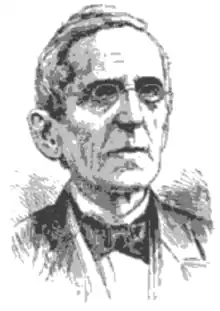George Sanderson | |
|---|---|
 | |
| Mayor of Lancaster, Pennsylvania | |
| In office 1859–1868 | |
| Member of the Pennsylvania State Senate | |
| In office 1851–1854 | |
| Constituency | 17th district |
| Personal details | |
| Born | February 25, 1810 Boston, Massachusetts |
| Died | April 1, 1886 (aged 76) Scranton, Pennsylvania |
| Political party | Whig |
| Spouse | Marion Kingsbury |
| Education | Boston Latin School |
| Occupation | Politician |
George Sanderson (February 25, 1810 – April 1, 1886) was an American politician who served as a Whig member of the Pennsylvania State Senate for the 17th district from 1851 to 1854[1] and as the tenth mayor of Lancaster, Pennsylvania, from 1859 to 1868.[2]
Early life
Sanderson was born in Boston, Massachusetts, and received his education at the Boston Latin School. He worked in merchandising in New York City, New York prior to his relocation to Geneva, New York.[3]
Following his marriage to Marion Kingsbury, he relocated with her to Towanda, Pennsylvania. He studied law and served as District Attorney for six years before resigning to work in private business.[3]
Career
He was elected to the Pennsylvania State Senate for the 17th district and served from 1851 to 1854. He befriended Colonel George W. Scranton in 1853 and became one of the founders of Scranton, Pennsylvania.[3]
As mayor of Lancaster, Pennsylvania, Sanderson formed the Lancaster City Police force in 1865.[4]
He died at his home in Green Ridge, Scranton on April 1, 1886, and was interred at Forest Hill Cemetery in Dunmore, Pennsylvania.[5]
References
- ↑ Cox, Harold. "Senate Members S". Wilkes University Election Statistics Project. Wilkes University.
- ↑ Mayors of the City of Lancaster, PA Archived August 25, 2010, at the Wayback Machine. Retrieved on 2009-10-25.
- 1 2 3 "Pennsylvania State Senate - George Sanderson Biography". www.legis.state.pa.us. Retrieved November 8, 2019.
- ↑ "A Brief History of the Lancaster Bureau of Police". www.lancasterpolice.com. Retrieved November 8, 2019.
- ↑ "Hon. George Sanderson". Times Leader. April 2, 1886. p. 1. Retrieved July 23, 2020 – via Newspapers.com.